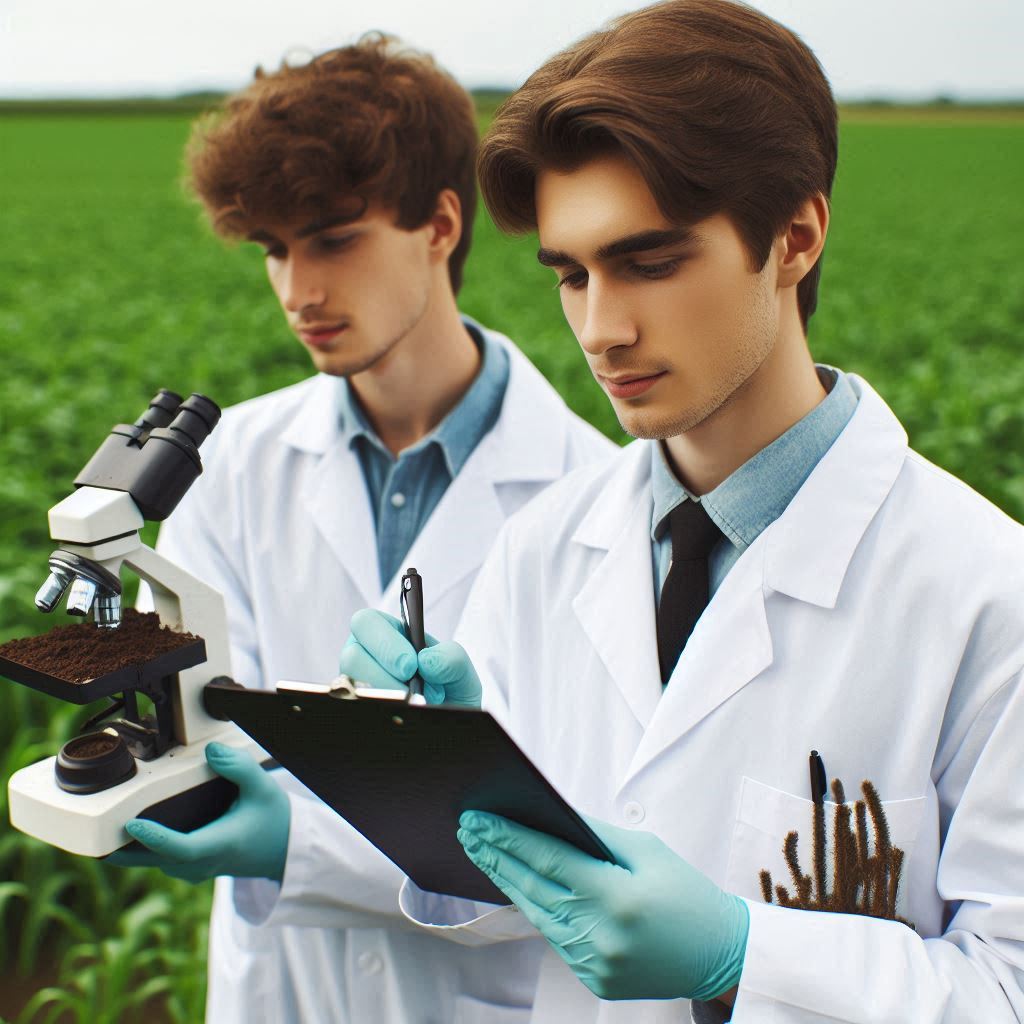Introduction
Sustainable farming is crucial for maintaining the health of our planet as soil scientist sustainable farming.
It focuses on producing food while preserving natural resources.
This approach reduces environmental impact and promotes biodiversity.
Sustainable practices ensure future generations can access healthy food and clean water.
Soil health is a foundation of sustainable agriculture.
Healthy soil supports robust crop growth and minimizes the need for chemical inputs.
Here, soil scientists play a vital role in promoting sustainable farming practices.
Soil scientists study the composition and health of soil.
They assess nutrient levels and recommend practices that enhance soil fertility.
By conducting soil tests, they identify issues that farmers may overlook.
Their expertise helps farmers make informed decisions about crop management.
Soil scientists also collaborate with farmers to implement sustainable techniques.
They guide farmers on crop rotation, cover cropping, and organic practices.
These strategies improve soil health and increase crop resilience.
Soil scientists are essential for advancing sustainable farming.
Their knowledge and recommendations contribute to healthier soils and more productive farms.
By prioritizing soil health, they support a sustainable future for agriculture and our environment.
What is a soil scientist?
Definition of a Soil Scientist
A soil scientist is a professional who studies soil and its properties.
They analyze how soil functions in the environment and its importance in agriculture.
Soil scientists possess expertise in soil composition, structure, and health.
Their work directly impacts farming practices and sustainable land use.
Their Expertise in Soil Composition and Health
Soil scientists evaluate soil types and their characteristics.
They conduct field studies to understand soil behavior under various conditions.
By sampling and testing soil, they assess its fertility and nutrient levels.
This analysis helps farmers optimize soil health and crop yields.
These professionals specialize in understanding soil composition.
They examine the mineral and organic matter within soil.
This knowledge helps them determine how different soils support plant growth.
By knowing soil types, scientists recommend suitable crops for specific regions.
Soil scientists also focus on soil health.
They assess soil microbiology and the presence of beneficial organisms.
Healthy soil supports diverse ecosystems and enhances plant resilience.
Soil scientists promote practices that maintain or improve soil health over time.
Their expertise extends to understanding soil erosion and degradation.
Soil scientists study how to prevent erosion caused by water and wind.
They develop strategies to conserve soil and maintain its quality.
This conservation is crucial for sustainable farming practices.
Additionally, soil scientists play a vital role in sustainable agriculture.
They advise farmers on best management practices.
These practices include crop rotation, cover cropping, and reduced tillage.
Implementing these strategies enhances soil health and increases productivity.
Soil scientists collaborate with agronomists and environmentalists.
They provide insights on how soil interacts with water and air.
This collaboration helps address challenges related to climate change and land use.
They contribute to creating sustainable farming systems that protect natural resources.
Through research and education, soil scientists raise awareness.
They inform farmers about the importance of soil management.
Their efforts promote sustainable practices that benefit both the environment and agriculture.
Soil scientists are essential for sustainable farming.
Their expertise in soil composition and health directly impacts agricultural practices.
By understanding soil’s role in ecosystems, they help farmers adopt sustainable methods.
Importance of soil health in sustainable farming
How Soil Health Affects Crop Yields
Soil health plays a crucial role in sustainable farming.
Healthy soil supports strong crop yields and enhances food production.
It provides essential nutrients and a balanced environment for plants to thrive.
Soil rich in organic matter improves water retention, fostering better growth conditions.
Farmers rely on healthy soil to cultivate diverse crops.
Healthy soil contains beneficial microorganisms that enhance nutrient availability.
These organisms break down organic matter, releasing nutrients for plants.
Healthy soils also prevent nutrient runoff, ensuring that crops receive adequate nourishment.
In contrast, soil degradation negatively affects crop yields.
Degraded soil lacks essential nutrients and organic matter.
This condition leads to poor crop growth and reduced agricultural productivity.
Farmers may struggle to maintain consistent yields without healthy soil.
Soil degradation occurs due to several factors.
Erosion, compaction, and nutrient depletion all contribute to declining soil health.
Practices like monocropping and excessive tillage exacerbate these issues.
Over time, degraded soil becomes less capable of supporting healthy crops.
Impact of Soil Degradation on the Environment
Soil health also impacts the environment beyond farming.
Healthy soils promote biodiversity by providing habitats for various organisms.
Diverse ecosystems enhance resilience against pests and diseases.
This natural balance reduces the need for chemical inputs, supporting sustainable farming practices.
Additionally, soil health influences water quality.
Healthy soils filter and retain water, preventing runoff and erosion.
This filtration process protects nearby water bodies from pollution.
Degraded soils can lead to sedimentation and nutrient loading in waterways, harming aquatic life.
Furthermore, soil health affects carbon sequestration.
Healthy soils store carbon, mitigating climate change impacts.
By promoting soil health, farmers can contribute to reducing greenhouse gas emissions.
This practice aligns with global efforts toward sustainable agriculture and environmental conservation.
Farmers can implement practices that improve soil health.
Crop rotation, cover cropping, and reduced tillage enhance soil structure and fertility.
These methods build organic matter and promote beneficial soil organisms.
Investing in soil health is essential for sustainable farming success.
Soil health is vital for sustainable farming.
Healthy soils enhance crop yields, support biodiversity, and protect water quality.
Soil degradation, on the other hand, threatens agricultural productivity and environmental health.
By prioritizing soil health, farmers can ensure a sustainable future for agriculture and the planet.
Adopting practices that enhance soil health benefits both crops and the environment.
Sustainable farming relies on maintaining healthy soil for long-term success.
Read: Challenges and Rewards: The Dual Life of an U.S. Environmental Scientist
Soil Scientist’s Role in Soil Conservation
Conducting Soil Tests to Assess Nutrient Levels
Soil scientists play a vital role in soil conservation.
They conduct soil tests to assess nutrient levels accurately.
These tests identify essential nutrients necessary for optimal plant growth.
By analyzing soil samples, scientists determine pH, nitrogen, phosphorus, and potassium levels.
Understanding soil nutrient levels is crucial for sustainable farming.
Farmers can make informed decisions about fertilization and amendments.
Soil scientists provide detailed reports on soil health, helping farmers understand their specific needs.
This information enables farmers to apply fertilizers judiciously, preventing overuse and minimizing environmental impact.
Soil tests also reveal potential contamination issues.
Soil scientists identify harmful substances that may affect plant health and food safety.
This knowledge empowers farmers to address problems early, ensuring safe food production.
Conducting regular soil tests helps maintain soil quality over time.
Additionally, soil testing can guide crop selection.
Soil scientists recommend suitable crops based on nutrient availability and soil type.
Matching crops to soil conditions increases yield potential and promotes sustainable practices.
Farmers benefit from the expertise of soil scientists in making strategic planting decisions.
Practices to Improve Soil Health and Fertility
Soil scientists recommend practices to improve soil health and fertility.
They advocate for techniques that enhance organic matter and nutrient retention.
One effective practice is cover cropping, which prevents erosion and enriches the soil.
Cover crops add organic material when decomposed, boosting soil fertility.
Another practice soil scientists endorse is crop rotation.
Rotating crops helps break pest and disease cycles.
This technique also enhances nutrient cycling, improving soil structure and health.
By recommending diverse cropping systems, soil scientists contribute to sustainable farming practices.
Conservation tillage is another essential recommendation.
This approach minimizes soil disturbance, preserving soil structure and moisture.
Reduced tillage also protects soil organisms, enhancing biodiversity.
Soil scientists promote these practices to improve long-term soil health.
Soil scientists also emphasize the importance of organic amendments.
Adding compost or manure increases soil organic matter.
This addition improves soil fertility and supports beneficial microbial communities.
Healthy soil fosters resilience against pests and diseases, reducing reliance on chemical inputs.
Educating farmers about sustainable practices is a key aspect of a soil scientist’s role.
They provide training and resources to help farmers implement effective soil conservation techniques.
By sharing knowledge, soil scientists empower farmers to adopt practices that protect soil health.
Soil scientists are crucial in soil conservation efforts.
They conduct soil tests to assess nutrient levels and identify potential issues.
Their recommendations help improve soil health and fertility through sustainable practices.
By working closely with farmers, soil scientists promote a healthier environment and enhance agricultural productivity.
Investing in soil conservation is essential for sustainable farming and food security.
Through their expertise, soil scientists contribute significantly to preserving and improving soil resources.
Read: Job Market Trends: Future of Chemistry Jobs in America
Collaborating with farmers
Working with Farmers to Develop Sustainable Farming Practices
Soil scientists collaborate closely with farmers to develop sustainable farming practices.
They understand local conditions and tailor solutions to meet specific needs.
By working together, they can enhance soil health and agricultural productivity.
These collaborations often begin with discussions about current farming methods.
Soil scientists assess existing practices and identify areas for improvement.
Farmers share their experiences and challenges, creating a foundation for effective strategies.
This dialogue fosters mutual understanding and respect.
Soil scientists provide valuable insights into sustainable practices.
They recommend techniques that conserve soil moisture, reduce erosion, and enhance fertility.
These practices include reduced tillage, which minimizes soil disturbance.
This method helps maintain soil structure and biodiversity.
Soil scientists also advocate for integrated pest management.
This approach combines biological, cultural, and chemical methods to control pests sustainably.
By working together, soil scientists and farmers can create effective pest management strategies.
Guidance on Crop Rotation and Cover Cropping
Guidance on crop rotation is a key aspect of collaboration.
Soil scientists educate farmers on the benefits of rotating crops annually.
Crop rotation improves soil structure and nutrient cycling.
It also disrupts pest and disease cycles, leading to healthier crops.
Soil scientists help farmers choose suitable crop combinations.
They consider soil type, nutrient availability, and market demand.
By selecting compatible crops, farmers can maximize yields and minimize risks.
This strategic planning enhances sustainability and profitability.
Cover cropping is another essential practice recommended by soil scientists.
They emphasize the importance of planting cover crops during the off-season.
Cover crops prevent soil erosion and enhance soil health.
They add organic matter to the soil when decomposed, improving fertility.
Soil scientists also guide farmers on selecting the right cover crops.
They provide recommendations based on local conditions and specific goals.
Some farmers may need cover crops for erosion control, while others seek to improve soil fertility.
Tailoring recommendations ensures farmers get the most benefit.
Regular follow-ups and evaluations are crucial in these collaborations.
Soil scientists and farmers assess the effectiveness of implemented practices.
They monitor soil health, crop yields, and pest populations.
This ongoing evaluation allows for adjustments and improvements over time.
Through collaboration, soil scientists and farmers create a sustainable farming system.
They share knowledge, experiences, and resources to enhance agricultural practices.
This partnership fosters a sense of community and mutual support.
Collaborating with farmers is essential for promoting sustainable farming.
Soil scientists provide guidance on effective practices like crop rotation and cover cropping.
Together, they can improve soil health, boost productivity, and ensure a sustainable future for agriculture.
By working hand in hand, they contribute significantly to the long-term success of farming and environmental stewardship.
Read: Challenges and Rewards: Navigating the Chemist Career Path

Implementing sustainable agriculture techniques
Promoting Organic Farming Methods
Soil scientists play a vital role in promoting organic farming methods.
They educate farmers on the benefits of organic practices.
Organic farming improves soil health and enhances biodiversity.
It reduces reliance on synthetic fertilizers and pesticides.
Soil scientists help farmers transition to organic methods.
They provide guidance on organic soil amendments, such as compost and manure.
These amendments improve soil structure and fertility while reducing environmental impact.
Additionally, soil scientists assist in developing organic pest management strategies.
They recommend natural pest control methods, like introducing beneficial insects.
These strategies minimize the use of harmful chemicals in farming.
Training sessions and workshops are effective for promoting organic farming.
Soil scientists conduct these sessions to share best practices with farmers.
They cover topics like crop rotation, companion planting, and soil fertility management.
Farmers benefit from practical demonstrations of organic techniques.
Soil scientists showcase successful case studies from local farms.
These examples inspire farmers to adopt organic practices.
Introducing Conservation Tillage Practices
Soil scientists also promote conservation tillage practices.
Conservation tillage minimizes soil disturbance, preserving soil structure and health.
This method reduces erosion and increases water retention in the soil.
Soil scientists educate farmers on different conservation tillage techniques.
They explain the advantages of no-till and reduced-till practices.
No-till farming allows farmers to plant directly into undisturbed soil.
This technique preserves soil moisture and enhances carbon sequestration.
Farmers adopting conservation tillage notice significant benefits.
They experience improved soil health and increased yields over time.
Additionally, conservation tillage can lead to reduced labor and equipment costs.
Soil scientists provide resources and tools for implementing conservation tillage.
They offer soil testing services to assess nutrient levels.
Understanding soil conditions helps farmers make informed decisions about tillage practices.
Regular training and support ensure successful implementation.
Soil scientists conduct workshops and field days focused on conservation tillage.
These events allow farmers to learn from each other‘s experiences and challenges.
Farmers often express concerns about transitioning to conservation tillage.
Soil scientists address these concerns by sharing research findings.
Evidence shows that conservation tillage leads to long-term benefits for soil health.
Collaboration between soil scientists and farmers is crucial.
Together, they develop customized conservation tillage plans.
These plans consider the unique challenges and goals of each farm.
Implementing sustainable agriculture techniques is essential for the future of farming.
Soil scientists promote organic farming and conservation tillage practices.
Their expertise helps farmers improve soil health and productivity while protecting the environment.
By adopting these methods, farmers can contribute to a more sustainable and resilient agricultural system.
Together, soil scientists and farmers pave the way for a brighter agricultural future.
Read: Diverse Career Paths: From Chemist to Patent Attorney in the US
Monitoring Soil Quality
Regularly Analyzing Soil Samples
Soil scientists monitor soil quality through regular analysis of soil samples.
They collect samples from various depths and locations in the field.
Analyzing these samples provides essential information about soil health and fertility.
Soil tests typically measure nutrient levels, pH, and organic matter content.
Soil scientists use this data to assess the soil’s current condition.
They identify deficiencies and imbalances that could affect crop growth.
Regular soil testing allows for early detection of potential problems.
Soil scientists can spot trends in nutrient depletion over time.
Identifying these trends helps farmers take timely action to restore soil health.
Farmers receive detailed reports summarizing the results of soil analyses.
These reports guide their decision-making regarding fertilization and amendments.
Soil scientists often recommend specific fertilizers based on the test results.
Timely soil testing can significantly enhance crop yields.
Farmers who monitor soil quality can make informed adjustments to their practices.
They can optimize their inputs and reduce waste, leading to more sustainable farming.
Adjusting Farming Practices Based on Recommendations
Soil scientists provide valuable recommendations for adjusting farming practices.
Based on soil test results, they suggest tailored interventions to improve soil health.
Farmers benefit from personalized guidance that considers their unique soil conditions.
For instance, if soil tests reveal nutrient deficiencies, soil scientists recommend suitable fertilizers.
They advise on the type and amount of fertilizer to apply.
This targeted approach enhances nutrient availability for crops.
Additionally, soil scientists may suggest soil amendments like lime or organic matter.
These amendments can correct pH levels and improve soil structure.
Implementing these recommendations leads to healthier soils and better crop performance.
Farmers also benefit from guidance on crop rotation practices.
Soil scientists emphasize the importance of rotating crops to maintain soil fertility.
They help farmers select appropriate crops for rotation based on soil needs.
Moreover, soil scientists encourage sustainable practices that improve long-term soil health.
They promote techniques like cover cropping and reduced tillage.
These practices enhance soil organic matter and prevent erosion.
Regular follow-ups ensure that farmers effectively implement recommendations.
Soil scientists often revisit farms to assess progress and provide ongoing support.
They help farmers adapt their practices based on the latest soil data.
Monitoring soil quality is crucial for sustainable farming.
It helps farmers understand the impact of their practices on soil health.
Farmers who actively engage in monitoring can foster healthier soils over time.
Soil scientists play a key role in monitoring soil quality.
Regular analysis of soil samples allows for informed decisions.
Adjusting farming practices based on expert recommendations enhances soil health and productivity.
This proactive approach contributes to sustainable agriculture and environmental protection.
Together, soil scientists and farmers can achieve optimal soil quality and long-term agricultural success.
Educating farmers and the community
Hosting Workshops and Seminars on Sustainable Farming
Soil scientists actively engage in educating farmers and communities about sustainable farming.
They host workshops and seminars that focus on best practices.
These events provide valuable insights into soil health and conservation techniques.
During these workshops, soil scientists share their expertise on various topics.
They cover soil testing methods, nutrient management, and organic farming techniques.
Farmers gain practical knowledge they can apply directly to their operations.
Interactive sessions encourage questions and discussions.
Participants can share their experiences and challenges in sustainable farming.
This open dialogue fosters a collaborative learning environment.
Soil scientists also demonstrate hands-on techniques during these events.
They show farmers how to conduct soil tests and interpret results.
Farmers leave with practical skills they can implement on their farms immediately.
By hosting workshops, soil scientists build a strong network within the community.
They connect with local farmers, agricultural organizations, and policymakers.
These connections help create a united front for promoting sustainable practices.
Raising Awareness About the Importance of Soil Conservation
Soil scientists play a vital role in raising awareness about soil conservation.
They emphasize the critical link between soil health and sustainable agriculture.
Communities must understand that healthy soil leads to productive farming.
Through public outreach programs, soil scientists disseminate essential information.
They distribute educational materials that highlight soil conservation benefits.
These resources include brochures, online content, and social media campaigns.
Soil scientists collaborate with schools to educate young people.
They conduct presentations and hands-on activities that teach students about soil.
Early education fosters a sense of responsibility for the environment.
Community events also provide platforms for soil scientists to raise awareness.
They participate in local fairs, farmers’ markets, and agricultural shows.
These events allow scientists to connect with a broader audience.
Soil health is essential for food security and environmental sustainability.
Soil scientists communicate this message to farmers and the general public.
They stress the need for conservation practices that protect soil from degradation.
By advocating for soil conservation, soil scientists contribute to long-term sustainability.
They help farmers adopt practices that enhance soil structure and fertility.
Techniques such as cover cropping and reduced tillage are often emphasized.
Communities benefit when soil scientists raise awareness about sustainable practices.
Increased knowledge leads to better decision-making among farmers.
Sustainable farming practices promote economic viability and environmental health.
Soil scientists play a crucial role in educating farmers and communities.
Hosting workshops and seminars empowers farmers with essential knowledge.
Raising awareness about soil conservation fosters a community commitment to sustainable practices.
Together, they work towards a future of healthy soils and sustainable agriculture.
Uncover the Details: Ethical Considerations in Geological Research
Transform Your Career Today
Unlock a personalized career strategy that drives real results. Get tailored advice and a roadmap designed just for you.
Start NowConclusion
Soil scientists play a crucial role in sustainable farming.
They assess soil health and recommend practices that enhance fertility.
Their expertise directly impacts crop yields and environmental preservation.
By collaborating with farmers, soil scientists promote sustainable agricultural practices.
They provide guidance on crop rotation and cover cropping.
This collaboration helps farmers maintain healthy soils and increase productivity.
Soil scientists also monitor soil quality regularly.
They analyze soil samples to track changes in health.
Their recommendations help farmers adjust practices to improve soil conditions.
Additionally, soil scientists educate communities about the importance of soil conservation.
Through workshops and seminars, they raise awareness of sustainable farming techniques.
This education fosters a collective commitment to preserving soil resources.
The significance of soil scientists extends beyond agriculture.
Their work ensures food security and protects the environment.
Healthy soils contribute to biodiversity and ecosystem stability.
In summary, soil scientists are vital for sustainable farming.
Their expertise in soil health leads to better farming practices.
They play a key role in preserving our environment and securing our food supply for future generations.
Prioritizing their work supports a sustainable future for agriculture and the planet.
[E-Books for Sale]
The Big Book of 500 High-Paying Jobs in America: Unlock Your Earning Potential
$19.99 • 500 High-Paying Jobs • 330 pages
Explore 500 high-paying jobs in America and learn how to boost your career, earn more, and achieve success!
See All 500 High-Paying Jobs of this E-Book
1001 Professions Without a Degree: High-Paying American Jobs You Can Start Now
$19.99 • 1001 Professions Without a Degree • 174 pages
Discover 1001 high-paying jobs without a degree! Unlock career tips, skills, and success strategies for just $19.99!




